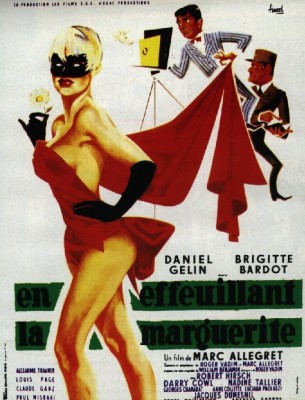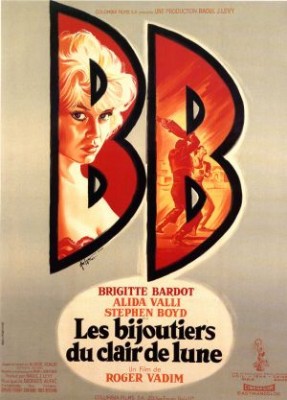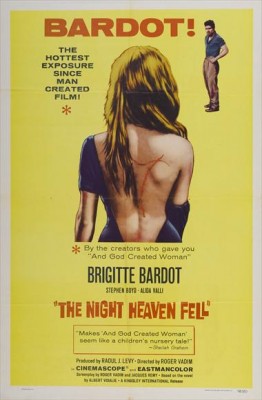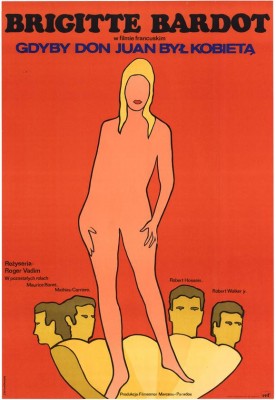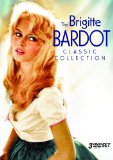| Reviews & Columns |
|
Reviews DVD TV on DVD Blu-ray 4K UHD International DVDs In Theaters Reviews by Studio Video Games Features Collector Series DVDs Easter Egg Database Interviews DVD Talk Radio Feature Articles Columns Anime Talk DVD Savant Horror DVDs The M.O.D. Squad Art House HD Talk Silent DVD
|
DVD Talk Forum |
|
|
| Resources |
|
DVD Price Search Customer Service #'s RCE Info Links |
|
Columns
|
|
|
Brigitte Bardot Classic Collection (Plucking the Daisy / The Night Heaven Fell / Don Juan or If Don Juan Were a Woman), The
Plucking the Daisy (En effeuillant la marguerite, also known in English under two equally unpromising titles, Mademoiselle Striptease and Please Mr. Balzac) is a routine French farce, with Bardot cast as Agnès Dumont, a singularly naïve provincial girl and would-be novelist living in Vichy with her martinet father, a general (Jacques Dumesnil). She goes to Paris to seek her fortune, planning to stay with her brother, Hubert (Darry Cowl), supposedly a fabulously successful artist but actually a museum guide at the meticulously preserved estate of Honoré de Balzac, the famous playwright and novelist. Unaware of this, Agnès arrives late at night and, assuming the place is her brother's, makes herself at home. The next morning, in need of cash, she innocently sells a signed first edition of Lily of the Valley (dedicated to Zulma Carraud) and goes on a spending spree.
Meanwhile, a newspaper reporter, Daniel Roy (Daniel Gélin), and his photographer friend Roger Vital (Robert Hirsch, who at the time resembled a genetic merging of Herbert Lom and Tony Curtis, a disconcerting sight) madly want to bed Agnès down. Later, when she tries to buy back the rare book by entering a striptease contest, hoping to use the prize money, she uses the pseudonym "Sophia" and hides her face behind a mask (Bardot speaks with an amusing Italian accent here). Daniel falls for "Sophia" too, unaware they're one and the same.
Around this time, Bardot usually played characters like this - innocently sexy and hopelessly naïve but not stupid. Her perennially sunny personality, though sometimes briefly irritated by persistent sexual advances, remains largely unfazed, confident all will be right with the world by the end of the story. She's nearly the whole show here, as Gélin and Hirsch are intensely irritating sexist pigs throughout (much more than was usual for the '50s), while Dumesnil is trite and Cowl is just plain odd. The latter's malapropisms seem to have been the actor's signature shtick.
Co-written by Bardot's husband, future director Roger Vadim, Plucking the Daisy is innocuous and unmemorable, famous in its day for its two striptease sequences, saucy stuff in the mid-1950s. There are brief flashes of nudity in this 101-minute version of the film, though Bardot keeps her clothes on, albeit wearing a sheer gown in one scene. There are a couple of funny characters here and there; an old taxi driver charmed by Agnès is himself delightful. The IMDb lists an uncredited Mischa Auer but I don't think that's him. Someone definitely in the film in a small role is beautiful actress Luciana Paluzzi as Agnès' Italian friend, also named Sophia; she was barely 19 years old at the time.
Besides the casual sexism throughout the picture, more extreme than the average episode of Mad Men, there's a strange element of sadism with Hirsch's character, who is literally set on fire in one scene (it looks perilous instead of funny), and a woman puts out her cigarette out on the back of his hand in another. (*** out of *****)
The Night Heaven Fell (Les bijoutiers du clair de lune) is a real oddity - a French-Italian co-production* set in rural Spain that plays like an American Western film noir, with a melodramatic second-half similar in plot to Godard's Breathless (1960) and Pierrot le fou (1965).
A busty blonde virgin fresh from the convent, French girl Ursula (Bardot, naturally), goes to live with her Aunt Florentine (Alida Valli). The aunt lives a sexless, unhappy life with her violent, domineering husband, Count Miguel de Ribera (José "Pepe" Nieto). Ursula arrives just as local lad Lamberto (Irish actor Stephen Boyd) angrily confronts Miguel over the suicide of his sister, who apparently had an affair with the cruel landowner. Miguel viciously beats Lamberto to a pulp. Later Miguel nearly beats Ursula when she refuses his slovenly advances.
Later, Lamberto and Aunt Florentine become involved; she's passionately fallen for him, though it's probable he just wants to exact revenge against Miguel. When he (sort of) accidentally kills Miguel, Lamberto ends up hightailing it to the remote countryside with Ursula at his side. She, it seems, loves him also.
As the posters above attest, by this time Bardot had become an international sensation, and director Roger Vadim, (her husband at the time though they'd be divorced by the time the film was released) weirdly turns what is really an ordinary if sordid, over-the-top melodrama into an excuse to tease (particularly male) audiences. Throughout the film Bardot is seen in various provocative states of semi-undress. She showers on-camera twice and in one scene parades around in her bra and panties. Toward the end there's a brief glimpse of Bardot's bare breasts. Except for that brief shot the film could probably be shown on commercial television with no edits today, but back then this was Hot Stuff. Even "nudies," the much more innocent precursors to soft- and later hard-core pornography, were still a few years away, at least in America. Bardot's busty body combined with a strange blend of wide-eyed innocence and come-hither uninhibitedness was the final word in feminine sexuality. Personally, I prefer the early Bardot as the wide-eyed innocent (in such films as Come Dance with Me!/Voulez-vous danser avec moi?) to the Vadim-fashioned female icon, and personally find Alida Valli's fully clothed but intensely repressed auntie more alluring.
Valli (as she was billed when under contract to David Selznick) already had enjoyed a long career stretching back to the mid-1930s, and until the 1950s was still considered quite the exotic beauty, what with her large, intense eyes and severe features. But like American film actress Mary Astor seemingly overnight she switched to matronly roles, character parts that kept her busy in films until 2002, not long before her death. She was (reportedly) only 37 at the time but tries to look older; the Italian actress speaks French and Spanish throughout the film, unlike co-star Boyd, who is obviously dubbed by someone else.
Boyd had a good role in The Man Who Never Was (1956), which led to his casting opposite Charlton Heston in Ben-Hur (1959), his most famous role. Despite showy parts in numerous epics, in which he was variable but generally okay, he never caught on with audiences. His career was seriously damaged after starring in the notoriously bad The Oscar (1966), and with good reason: despite a terrible script and a wildly miscast Tony Bennett in support, Boyd gave what this critic still regards as the Worst-Ever Performance by a Leading Actor in a Major Hollywood Film. (***)
Don Juan or If Don Juan Were a Woman (Don Juan ou Si Don Juan était une femme... ) is just dreadful, a pointless exercise in stylized misanthropy, a feeble attempt in this "dans un film de Vadim" to restore the filmmaker's taboo-busting provocateur status. Bardot, then 38 and her youthful innocence long gone, gives a notably unenthusiastic, uncaring performance.
The plot, such as it is (with spoilers), casts B.B. as Jeanne, who claims to have been the great lover Don Juan in a past life, but now as a woman devotes herself to the destruction of all men. Summoning her younger cousin Paul (Mathieu Carrière), a priest, she confesses, albeit unrepentantly, to past sins.
In flashback, she tells how she destroyed the career and family of a respected magistrate and university professor, Pierre (Maurice Ronet), luring him into an orgy of college students.
Jeanne next goes after cruel husband Louis Prévost (Robert Hossein) by seducing his mousy wife, Clara (Jane Birkin), into a lesbian fling. When he finds them in bed together Louis thinks Jeanne has arranged a ménage a trios - and is notably disappointed when he learns that it's not.
Jeanne has sex with a seemingly innocent, sincere guitarist (Robert Walker, Jr., not dubbed) who loves her, but he commits suicide when she apparently rejects him. Jeanne's "confession" to her priest of a cousin ends exactly the way you suspected it would ten minutes in.
Utterly pointless, Don Juan doesn't work on any level. The man-hater vs. misogynists structure is unappetizing ("You're strong, mean, and horrible," Jeanne admonishes Louis, in a typically inane exchange), and it's hard to take its feminist/empowering treatise (if that's what it is) seriously coming from French cinema's most notorious womanizer.
The sex scenes are curiously unerotic, thanks to bad directorial choices. The blocking spoils a shot of Bardot and Birkin naked and in bed together: Bardot uncomfortably holds a lit cigarette right over Birkin's vagina, like a careless camper in a dry forest. A later sex scene is compromised by Bardot's slovenly appearance: her bare feet are positively filthy, like she had just come back from a stroll through a coal mine.
Vadim's erotic concepts are at times bemusing. Early in the film there's a tight close-up of Bardot washing her cousin's greasy hands in a bathroom basin, apparently an attempt by Vadim to get his audience excited. It goes on forever. A great overuse of the film's loopy title theme song, repeated ad infinitum, extends to several sex scenes, rendering them even more ridiculous.
The production design by Jean André is as silly as everything else. Jeanne lives in a dilapidated submarine (!) but the interior settings are much less believable than the sub inhabited by The Joker, Penguin, Riddler, and Catwoman in Batman (1966). Bardot's sub is decked out with a stylish blinking traffic light, a wall with enormous red lips, windows to look at the fishies outside, and lots of shiny silver and glass. It's like something out of Space: 1999. (The real-world locations are at least visually interesting.)
Near the end, Jeanne asks her friend, "Out of style? Me? Not really." But by this time Bardot sure was, and Vadim more so. (* 1/2)
Video & Audio
Plucking the Daisy looks quite nice, an excellent full-frame, black and white presentation of the original, uncut French version, complete with brief flashes of nudity. The mono audio is also above average and the subtitles are good.
The Night Heaven Fell, in 2.35:1 CinemaScope and Eastman Color, is properly 16:9 enhanced, though the film elements are weak, grainy and brown. They also exhibit some damage and reel change cues. For some reason, at 80:20, the dialogue track is silent through several lines of subtitled dialogue. Despite Columbia Pictures' involvement and Stephen Boyd's major role, The Night Heaven Fell does not include an alternate English track, but the mono French one (with some Spanish) is adequate.
The 1.66:1 Don Juan, a French-Italian co-production, is also enhanced, properly pillarboxed and sourced from a French element crediting Concinor as presenter. It is bright and colorful and includes the original exit music. It's French mono track is likewise acceptable.
Extra Features
Except for a Bardot filmography, the only notable extras are unsubtitled trailers for Plucking the Daisy, And God Created Woman..., and The Night Heaven Fell. If smaller indie labels can subtitle their foreign language trailers, Janus Films/HVe ought to be doing theirs as well.
Parting Thoughts
In the final analysis, none of these films is very good, though the first is moderately entertaining and the latter two are at least interesting, though I might have given up on Don Juan pretty early on had I not been reviewing it. Still, for Bardot fans, those interested in the shifting styles and tastes of early postwar French cinema as seen through (for the most part) one filmmaker and his muse, then The Brigitte Bardot Classic Collection is worth the time and effort. Rent It.
* Columbia Pictures distributed the film, and may have invested in its production as well. During the middle 1950s they became active in distributing more foreign productions that probably any of the major studios.
Stuart Galbraith IV's latest audio commentary, for AnimEigo's Tora-san DVD boxed set, is on sale now.
|
| Popular Reviews |
| Sponsored Links |
|
|
| Sponsored Links |
|
|
| Release List | Reviews | Shop | Newsletter | Forum | DVD Giveaways | Blu-Ray | Advertise |
|
Copyright 2024 DVDTalk.com All Rights Reserved. Legal Info, Privacy Policy, Terms of Use,
Manage Preferences,
Your Privacy Choices | |||||||









